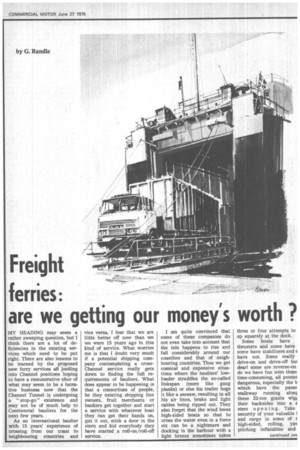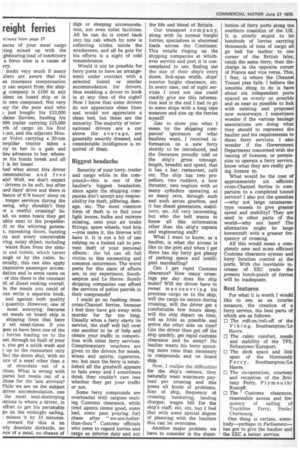Freight ferries: are we getting our money's
Page 29

Page 30

If you've noticed an error in this article please click here to report it so we can fix it.
worth ?
MY HEADING may seem a rather sweeping question, but I think there are a lot of deficiencies in the existing services which need to be put right. There are also lessons to be learned by the proposed new ferry services all jostling into Channel positions hoping to have a remunerative slice of what may seem to be a lucrative business now that the Channel Tunnel is undergoing a "stop-go" existence and may not be of much help to Continental hauliers for the next few years.
As an international haulier with 15 years' experience of crossing from our coast to neighbouring countries and vice versa, I fear that we are little better off now than we we were 15 years ago in this kind of service. What worries me is that I doubt very much if a potential shipping company contemplating a crossChannel service really gets down to finding the full requirements of hauliers. What does appear to be happening is that a consortium of people, be they existing shipping line owners, fruit merchants or bankers get together and start a service with whatever boat they can get their hands on, gut it out, stick a door in the stern and kid everybody they have started a roll-on/roll-off service, I am quite convinced that some of these companies do not even take into account that the tide happens to rise and fall considerably around our coastline and that of neighbouring countries. Thus we get comical and expensive situations where the hauliers' lowloader straddle's the so-called linkspan (more like gang planks) or else his trailer hogs it like a seesaw, resulting in all his air lines, brake and light cables being ripped out. They also forget that the wind loves high-sided boats so that to cross the water even in a force six can be a nightmare and docking in the harbour with a light breeze sometimes takes three or four attempts to up squarely at the dock.
Some boats have thrusters and some have some have stabilisers and s have not. Some really drive-on and drive-off bui dear! some are reverse-on do we have fun with them time-consuming, all potent dangerous, especially the b which have the passe walkway running alorq these 32-ton giants wigl their backsides into a s stem opening. Take security of your valuable 1 and cargo in some of t high-sided, rolling, yaN pitching inflatables and ances of your meat cargo tting mixed up with the ghbouring load of machinery a force nine is a cause of ,n-y.
doubt very much if many _fliers are aware that the ist insurance compensation y can expect from the shipig company is E100 in any ident on board ship or in iir own compound. Not very my for the poor soul who just bought his £10,000 .dame Saviem, hauling his 000 trailer carrying £.15,000 rth of cargo on his first ) out, and the adjacent Monur Volvo carrying a 20-ton terpillar tractor takes a icy to her in a gale and kes advances to her, where)fl his bonds break and all 1 is let loosel knd what about this driver :ommodation and free als? Well, we don't expect drivers to be soft, but after lard days' drive and there is hence of 6/8 hours' sleep on longer services during the ,ssing, why shouldn't they re a restful crossing? Inad, on some boats they get abin next to the propellerSt or the whirring generas, squeaking doors, buzzing its and every conceivable ving, noisy object, including waste flues from the abluas and toilets, which career ough or by the cabin. Inentally, this can also apply expensive passenger accomdation and in some cases on of this there is the constant of diesel reeking overall. ln the meals you could of irse write a separate book, and against both quality I quantity. However, one of most annoying features iut meals on board ship is shipping lines that have y set meal-times. If you ipen to have been one of the t lorries loading on to the sel, through no fault of your a, you get a quick wash and r up to the restaurant only Ind the doors shut, with no nce of a meal other than a of chocolate out of a :thine. What is wrong with pared hot meals out of a chine for the late arrivals? Vhile we are on the subject driver accommodation, one the most soul-destroying iations is where a driver, in effort to get his perishable go on the midnight sailing, : misses it by 10 minutes. reward for this is an ?,rly desolate dockside, no nee of a meal, no chance of digs or sleeping accommodation, not even toilet facilities. All he can do is crawl back into his cab which by now is collecting icicles inside the windscreen, and all he gets for his efforts is a night of cold remembrance.
Would it not be possible for ferry ports to have an arrangement under contract with a selected hostel or similar accommodation for drivers, thus enabling a driver to book in at any time of the night? Now I know that some drivers do not appreciate clean linen and would not appreciate a clean bed, but these are the minority. The majority of international drivers are a cut above the av e r ag e, are generally smartly dressed, and considerable intelligence is required of them.
Biggest headache
Security of your lorry, trailer and cargo while in the compound—this is one of the haulier's biggest headaches, since again the shipping companies don't accept any responsibility for theft, pilfering, damage, etc. The most common form of theft is to find your light lenses, bulbs and mirrors missing, next your air brake fittings, spare wheels, tool kits —you name it, the thieves will have it. It is not a bit of use relying on a locked cab to prevent theft of your personal effects : the lot can all fall victim to this nauseating and common occurrence. The worst ports for this state of affairs are, in my experience, Southampton and Le Havre. Surely shipping companies can afford the services of police patrols in their compounds?
I could go on faulting these cross-Channel ferries, because I feel they have got away with murder for far too long. Usually when a ferry starts its service, the staff will fall over one another to be of help and obtain your traffic in competition with other ferry services. Complimentary vouchers are given to the drivers for meals, wines and spirits, cigarettes, etc, but once the ferry is established all the goodwill appears to fade away and I sometimes think they couldn't care less whether they get your traffic or not, Some ferry compounds are overloaded with cargoes waiting Customs clearance, while tired agents (some good, some bad, some past praying for) chase after "we-are-holierthan-thou 'T Customs officials who seem to regard lorries and cargo as inferior duty and not the life and blood of Britain.
Our transport comp an y, along with its normal freight lorries, specialises in abnormal loads across the Continent. This entails ringing up the shipping companies at whichever service and port it is contemplated to use, finding out the size of their ship's entry doors, link-span width, ships' interior height clearance, etc. In every case, out of eight services I tried not one could readily give me this information and in the end I had to go to some ships with a long tape measure and size up the ferries myself!
Just to show you what I mean by the shipping companies' ignorance of what hauliers want, I received information on a new ferry shortly to be introduced, and the literature proudly told us the ship's gross tonnage, length, breadth and speed, that it has a bar, restaurant, café etc. The ship has two propellers, two rudders, a bow thruster, two engines with so many cylinders operating at so many revs, through such and such series gearbox, and it has diesel generators, stabilisers, etc. All very interesting, but who the hell wants to know +all this information other than the ship's captain and engineering staff?
What I want to know, as a haulier, is what the access is like to the port and when I get there has my lorry got plenty of parking space and intelligent marshalling?
Can I get rapid Customs clearance? How many crossings per day does the ship make? Will my driver have to sweat manoeuvring his precious cargo on to the ship, will the cargo be secure during crossing, will the driver get a comfortable few hours sleep, will the ship depart on time, roll as little as possible and arrive the other side on time? Can the driver then get off the ship quickly, get rapid customs clearance and be away? No haulier wants his lorry spending more time than necessary in compounds and on board ship.
Now, I realise the difficulties for the ship's owners, they naturally want maximum payload per crossing and this poses all kinds of problems. Size of ship, frequency of crossing, bunkering, landing charges, wages bill for the ship's staff, etc, etc, but I feel that with some special degree of planning with the hauliers this can be overcome.
Another major problem we have to consider is the distri bution of ferry ports along tne southern coastline of the UK. It is utterly stupid to let hundreds of lorries carrying thousands of tons of cargo all go hell for leather to one corner of the British Isles, catch the same ferry, then discharge in the opposite corner of France and vice versa. This, I fear, is where the Channel Tunnel plan fails, I believe the sensible thing to do is have about six independent ports spaced as evenly as possible and as near as possible to link with existing and proposed new motorways. I sometimes wonder if the various haulage associations are doing what they should to represent the haulier and his requirements to these ferry services. I also wonder if the Government Department concerned with the issuing of licences, or permission to operate a ferry service, know what they are really giving licence to.
What would be the cost of approximately six efficient cross-Channel ferries in comparison to a completed tunnel service? I also put the question —why not large catamarantype vessels to give greater speed and stability? They are used in other parts of the world—why not here? The alternative might be large hovercraft with a greater frequency of crossing.
All this would mean a completely new and more efficient Customs clearance system and lorry location control at the ports. With the inevitable increase of EEC trade the present hotch-potch of ferries will be inadequate.
Best features •
For what it is worth I would like to see, as an interim measure, the creation of a ferry service, the best parts of which are as follows: ID The roll-on/roll-off of the Vik in g, Southampton/Le Havre.
0 The cabin comfort, meals and stability of the TFS, Fel ixstowe/Europort.
O The deck space and link span of the Normandy Fer r y, Southampton/Le Havre.
0 The co-operation, courtesy and reception of the Brittany Ferry, Plymouth/ Roscoff.
O The Customs clearance, reasonable access and frequency of sailing of Truckline Ferry, Poole/ Cherbourg.
One thing is certain, somebody—perhaps in Parliament— has got to give the haulier and the EEC a better service.




















































































